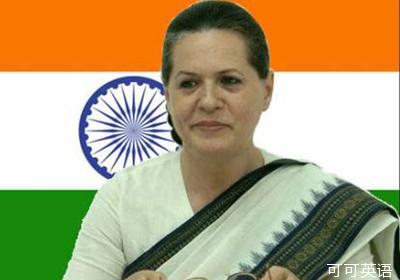(单词翻译:单击)
Books and Arts; Book Review;Politics in India; Iron lady;
文艺;书评;印度政治;铁娘子;
Sonia Gandhi: An Extraordinary Life. By Rani Singh.
索尼娅·甘地:非同寻常的一生;拉尼·辛格著。
LAST year a supporter of Sonia Gandhi threatened legal action and succeeded in preventing the publication in English of “The Red Sari”, a fictionalised life which had already had a successful run in Spanish and Italian. Although a couple of biographies have been published in India, Rani Singh’s “Sonia Gandhi: An Extraordinary Life, An Indian Destiny” is the first for an international market.
《红色纱丽》一书歪曲地描述了索尼娅•甘地的生活,此书的西班牙语和意大利语版本都广受欢迎。而英文版《红色纱丽》一书的出版却受到了索尼娅•甘地的一名支持者的阻挠,他扬言要采取法律手段,最终他成功了,英文版并没有出版。在印度国内,尽管有一些关于索尼娅•甘地的传记已经出版,但拉丽辛格的《索尼娅•甘地:卓越的一生,一个印度人的宿命》却是第一本面向全球读者的传记。

When Sonia married Rajiv, son of the prime minister, Indira Gandhi, in Delhi in 1968, nobody predicted great things for her. She was pretty, personable and very shy. Like her husband, she had few academic qualifications. Her father was a builder from a town on the outskirts of Turin. Although the Nehru-Gandhi family was not, as Ms Singh states several times, aristocratic, they and their circle could certainly be snooty. It was not unusual in the 1990s to hear Sonia Gandhi referred to in Delhi social circles as “the Italian au pair”.
1968年,索尼娅•甘地在新德里和当时的印度总理英迪拉•甘地(甘地夫人)的儿子拉杰夫•甘地结婚。人们对她并无多大的期待。索尼娅•甘地面容姣好,姿态优雅,害羞内敛。同她丈夫一样,她在学术上建树甚少。她的父亲是一个建筑工人,来自都灵市郊一个小镇。辛格不止一次将尼赫鲁-甘地家族描述为是有着贵族习气,尽管事实情况并非完全如此,但他们的小圈子的确是高傲势利。(尼赫鲁-甘地家族本可以待人傲慢,但事实上,他们这个小圈子并不像辛格在书中不止一次的描写的那样喜欢摆贵族的架子)在20世纪90年代,新德里的社交圈将索尼娅•甘地称为“意大利帮工”的情况已经很少再出现了。
Today Mrs Gandhi is the most powerful politician in India. Earlier this year when she went for treatment at Memorial Sloan–Kettering Cancer Centre in New York, the government was left rudderless. Characteristically, no announcement was made as to where she had gone, or whether her illness was serious. Cabinet ministers were reduced to asking each other, and even in some cases the media, for information about her condition.
如今,索尼娅•甘地已是印度最有权力的政治家。今年的早些时候,她前往纽约的梅莫瑞尔•斯欧恩-凯特林 癌症中心接受治疗,政府群龙无首。有一个典型的例子:政府就她的去向,健康状况没有做任何的声明。内阁部长们不得不相互询问,有些时候甚至向媒体打听索尼娅•甘地的情况。
When she returned to India in September and resumed her duties as president of the ruling Congress Party, the immediate crisis appeared to stabilise. Mrs Gandhi’s position—which might best be described as a dynastic moral authority—now stems less from the fact that she is Rajiv’s widow than from her intuitive strategic sense and her discreet, often silent, ability to assert political control.
当索尼娅•甘地九月份回到印度,再次开始她国会党主席的工作时,原本混乱的状况一似乎下子秩序井然。人们关于她的地位最恰当的描述是“王朝的精神领袖”,原本是因为她是拉吉夫的遗孀,而现在则更多的是因为她在政治上直觉敏锐,思想具有战略性,寡言慎行,对政治工作有绝对的掌控能力。
It is hard to determine just how she does this, since her senior colleagues know they would soon fall from favour if they broke the omerta that surrounds her. Sonia Gandhi almost never gives interviews, although the few she has done on Indian television have been surprisingly open and direct, recounting the tragedy of her husband’s assassination in 1991 and her own inclusive social ideals.
人们不知道索尼娅•甘地是如何做到这些的。但她身边和她共事多年的同事们知道,要是他们胆敢损害索尼娅•甘地的美好形象(风言风言),他们也将地位不保。索尼娅•甘地极少接受采访,在她为数不多的几次电视访问里,她一反常态地非常公开和直接地讲述着1991年他的丈夫遇刺的悲剧经历,分享着她自己的社会理想。
Ms Singh says she follows “her own brand of socialism”, which is an exaggeration. Rather than socialism, it is an emphasis on protecting the disadvantaged even while proceeding with India’s at times rapacious version of capitalism. Since she does not hold a ministerial post, Sonia Gandhi can appear detached from government policy, and row back from difficult decisions when they prove unpopular. A symbolic performance is combined with studious political negotiation.
辛格说索尼娅•甘地在践行她独有的社会主义,这实在有些夸大其词。与其是说走社会主义之路,索尼娅只是在印度大肆发展资本主义的同时更强调保护弱势群体的利益。由于她并没有内阁的席位,索尼娅可以表现得和政府的政策相背而行,当政府的决定不受欢迎时再提出自己的见解。这种象征性的表演常常体现在和与政府频繁进行的政治性协商中。
There are several difficulties with this biography. Ms Singh, a London-based journalist and broadcaster, appears to think that her duty as a biographer is to write a hagiographical defence of her subject. The enthusiastic tone extends to most members of the Gandhi family. When Indira Gandhi made a controversial snap decision to nationalise India’s big banks, the reader is told simply that crowds danced in the streets in jubilation: “Indira had an instinctive feeling for what would please people and would move heaven and earth to deliver.”
辛格是一名驻扎在伦敦的记者和播音员。在写这本书的时候有很多困难。她认为自己作为传记的撰写者,其职责就是要为她书中主角树立正面形象,因此她对甘地家族成员的评价都甚高,当记叙到甘地夫人当机立断,推行了一项颇有争议的国有化印度大型银行的政策时,辛格仅仅描述了人们在街上欢乐地跳舞庆贺。她还写到“甘地夫人天生知道如何迎合别人,她也竭尽全力地利用这一点。”
There is no indication that Ms Singh has had access, during her research, to either Sonia Gandhi herself, or to any of the people who are close to her. The book shows scant political understanding. Sikh militancy, Kashmir, the Sri Lanka conflict and the Bangladesh war are recounted in school textbook prose, accompanied by some baffling non sequiturs.
没有任何的迹象表明辛格在撰写这本书做研究期间,有机会接近索尼娅•甘地或是她身边的人。此书政治见解略显浅薄。书中关于锡克教的斗争,克什米尔,斯里兰卡冲突,孟加拉的战争的记叙走只停留在教科书的水平,同时还记叙了一些不相关的战争。(还下了一些不想干的令人困惑的结论)
When the narrative becomes more personal, the reader is offered anecdotes such as this: “Presented with a tray of freshly made juices, Sonia studied the options carefully: papaya, lime, orange, fresh mango, and coconut water, before choosing the last one.” Would history have turned out differently if she had chosen the lime?
当作者叙述平日的琐碎生活之时,读者会读到这样的句子“索尼娅面前放着众多的鲜榨的果汁,有番木瓜汁,酸橙汁,橘汁,新鲜芒果汁和椰子汁,她细细地选择着,最后选择了椰子汁。如果她最后选了酸橙汁,这对历史有什么影响呢?


